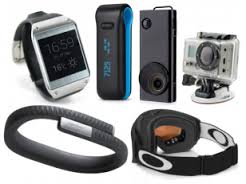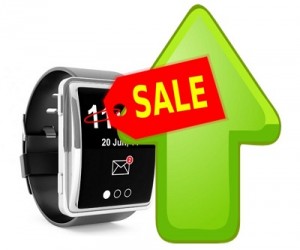A new forecast from IDC has predicted that smartwatches, fitness trackers and other wearables are rising fast.
This year, the International Data Corporation (IDC) reported a massive surge in the wearable technology market, which it said saw growth of 300 percent due to the sale of products such as the Fitbit Surge, Apple Watch and Pebble Time.
The IDC has released a report saying that by the end of 2016, worldwide shipments will hit 111.1 million.
That will mean that wearable technology will have seen an increase of 44 percent over the figure from 2015. That said, by the year 2019, shipments of wearables will have broken through the 214.6 million mark. According to the wearables team research manager at IDC, Ramon Llamas, “In a short amount of time, smartwatches have evolved from being extensions of the smartphone to wearable computers capable of communications, notifications, applications, and numerous other functionalities.”
It was also pointed out that wearable technology devices are experiencing a rapid evolution.
 Llamas went on to point out that just because they’re starting to sell and they will be seeing rapid growth over coming years, it doesn’t mean that the smartwatches we currently know will be the ones that actually take off over the next few years. He explained that “The smartwatch we have today will look nothing like the smartwatch we will see in the future.”
Llamas went on to point out that just because they’re starting to sell and they will be seeing rapid growth over coming years, it doesn’t mean that the smartwatches we currently know will be the ones that actually take off over the next few years. He explained that “The smartwatch we have today will look nothing like the smartwatch we will see in the future.”
He also underscored the forecast that the details of these devices will be quite different from what we currently see. The health sensors, cellular connectivity and even the wearables app market – which is already rapidly on the grow – will be ready to provide serious game changing evolutions in this market. Llamas feels that it will be in those areas that the gadgets will start to define themselves as having value and will become appealing to consumers.
While many of its predictions aligned well with other reports that have been issued by various prediction firms, the IDC report was somewhat different in that it has said that watchOS and Android Wear will be grabbing the top two spots (respectively). That said, it also stated that Tizen from Samsung will carve out an important segment of the market over the next four years, as well, to the point that it might swipe away some of the share that would otherwise have belonged to Android Wear.

 The researchers found that the Apple Watch was particularly incapable of collecting accurate heart rate feedback during physical activity.
The researchers found that the Apple Watch was particularly incapable of collecting accurate heart rate feedback during physical activity.